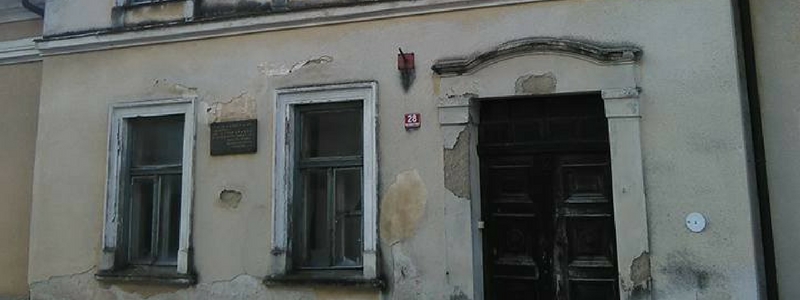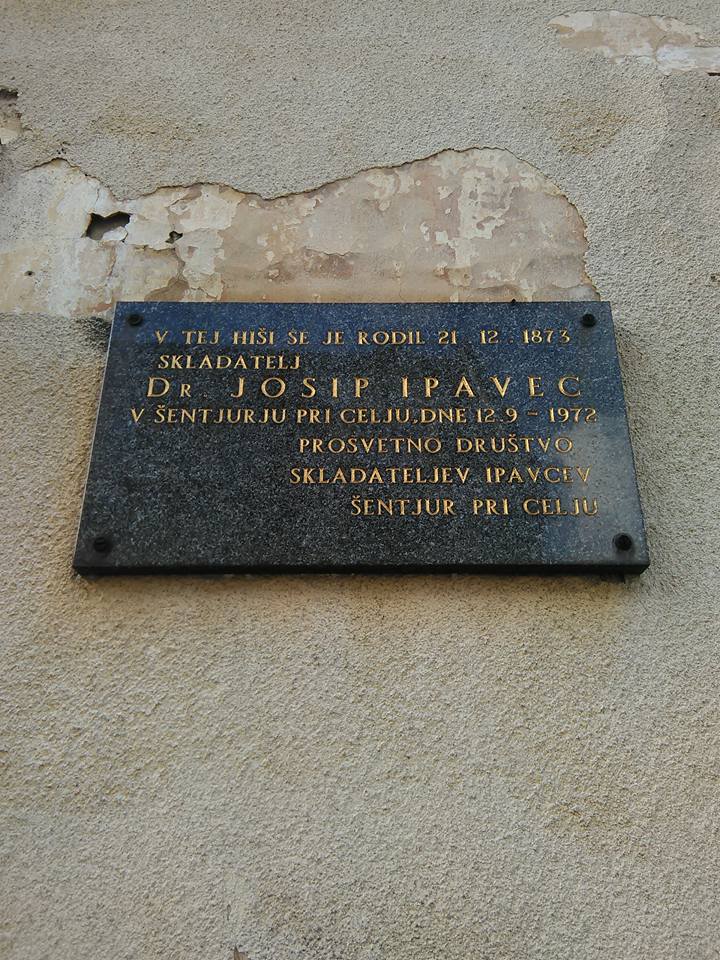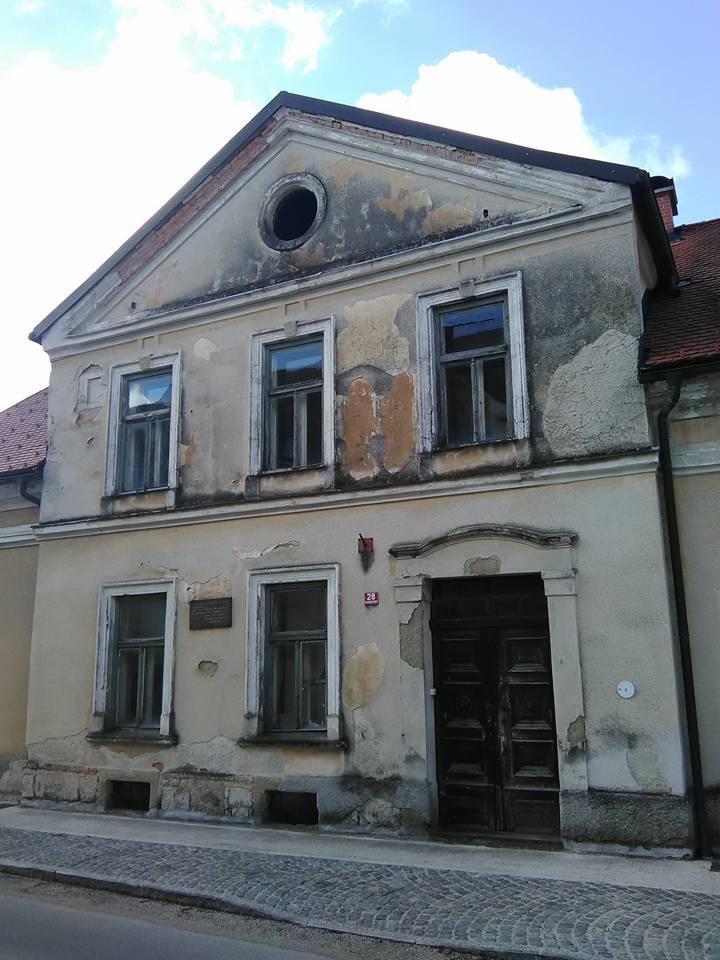The building in which Josip Ipavec was born stands opposite the birthplace of his father, Gustav. The uniformly designed, single-storey five-bay house from the first half of the 19th century has an oblong ground plan. The exterior features a modest classicistic facade with a pronounced central part – a triangular gable and slightly protruding avant-corps. The interior with a prominent staircase is a fine example of the residential culture of a wealthy town family.
Privately owned by a descendant of Josip Ipavec, the house contains Ipavec’s authentic piano and Secessionist style furniture. Most of Josip Ipavec’s sheet music and scores are housed by the National and University Library in Ljubljana.
Benjamin, Gustav and Josip Ipavec
With its profound impact on both Slovenian medical practice and musical life, the notable Ipavec family left an enduring historical legacy, both in the context of their hometown, Šentjur, and Slovenia in general. The family’s precise origin is unclear; according to some sources, they could have come from the Vipava Valley, based on the assumption that the original version of their name was Vipavec.
Most of the family were educated in Graz and Vienna, training to become physicians by profession, and musicians at heart. Showing a special affinity and talent for musical creativity, the artistic endeavours of the male members of the Ipavec family enriched Slovenian cultural life during the Austro-Hungarian Empire. Following the footsteps of their forebears, the brothers Benjamin and Gustav were educated in Graz, and became doctors, while engaging in music as a pastime.
The output of Benjamin Ipavec (1829–1908), who focused his creative energies primarily on vocal music, should be viewed from the narrower musical perspective of the time after the revolutions of 1845 in the Habsburg Empire, when music became one of the major vehicles for affirming Slovenian national identity. Benjamin gave the nationalist spirit a musical dimension in his numerous lieder based on poems expressing Slovenian nationalism, particularly those by France Prešeren. A physician and amateur composer, Ipavec studied composition in Graz under the influential Wilhelm Mayer, whose students included F. Busoni, F. Weingartner and W. Kienzl.
The musical legacy of Benjamin Ipavec, ranging from lieder to his major instrumental piece, Serenade, is regarded by musicologist Dr Ivan Klemenčič as the ultimate expression of ‘Slovenian national character’. National sentiments are primarily voiced in his lieder, which include Rožmarin, Pastirček and Pojdem na prejo (Rosemary, Shepherd Boy, I’ll Watch the Girls Spinning) which were performed at bésede – the Reading Society concerts held in the second half of the 19th century following the example of the Czech reading societies movement. Although not primarily a politically oriented artist, Benjamin set to music several major songs of national awakening, including Zdravljica (A Toast) by Prešeren and Ilirija oživljena (Illyria Revived) by Valentin Vodnik, for the Slovenian societies. Similarly involved in the national revival movement, his brother Gustav assisted Benjamin with the artistic leadership of the Reading Society Choir.
Benjamin’s output includes four extended cantatas and music composed for performance in theatres, i.e. operatic works, an important example of the early beginnings of theatre music in Slovenia. Written within the context of the Slovenian Reading Society’s endeavours to promote the expansion of dramatic arts and strivings towards more relevant theatre-music forms, the singspiel Tičnik (The Aviary) nevertheless dispenses with national historical themes in favour of lighter subject matter well suited to the genre. The singspiel, which received its premiere in 1866 in the Ljubljana Reading Room, was based on a text whose storyline contained a love triangle commonly found in commedia dell’arte and opera buffa, and features a lighter style and farcical humour. This singspiel was one of the precursors to, and vital catalysts of, the emergence of original Slovenian theatre music.
In his analysis of the work, musicologist Dr Gregor Pompe examines the simpler musical texture of Tičnik, which can probably be attributed to the composer’s making do with the technically less competent local actor/singers and musicians, while its distinctive melodic fabric occasionally evokes elements of folk music. The numerous subsequent performances (five in 1866 and then several in 1869, 1872 and 1888) alone testify to the piece’s considerable popularity. When the singspiel was staged in Trieste, music critics drew attention to its pervasive Slovenian character. Benjamin Ipavec’s first and only opera, Teharski plemiči (The Noblemen of Teharje), which received a less favourable critical reception for supposedly approaching the genre of a national singspiel rather than an opera, was premiered in 1892.
Gustav Ipavec (1831–1908) was a physician, composer and local politician. While studying in Graz and Vienna, Gustav associated with prominent compatriots committed to asserting national identity, and together with his brother Benjamin devoted his efforts to establishing the Styrian Reading Society. It was in Vienna, the seat of the Habsburgs, that he began composing. However, his more serious interests, which had a political dimension – unlike his brother Benjamin’s – prevailed over his musical pursuits. He distinguished himself as a dedicated mayor of Šentjur and launched a newspaper called Slovenski narod (The Slovenian Nation). Gustav Ipavec was awarded two Gold Crosses of Merit with a Crown in recognition of his services to the Slovenian nation.
Gustav Ipavec’s patriotic compositions were performed by the choir of the Maribor National Reading Society and various Slovenian choral societies, founded in great numbers after 1861 in the wake of the national revival. Some of the most popular songs were Kje so moje rožice, Zvezda and Pod lipo (Where Are My Flowers?, A Star, Under a Lime Tree), the last-named of which was performed in Maribor during a choral festival, a commemoration of the first anniversary of the Reading Society, which attracted an attendance of 700. Slovenec sem! (I Am a Slovenian!) is recognised as his most popular song, a resounding success both in Slovenia and Croatia. Displaying a simple homophonic musical texture and deriving inspiration from the melodic contours of Slovenian folk songs, the great bulk of Gustav’s songs comprise drinking songs, toasts written in the liedertafel style.
Gustav’s family home in Šentjur served as the main cultural hub of the neighbouring areas, and was visited by notable artists and intellectuals, including world-acclaimed composers Johannes Brahms and Wilhelm Kienzl Jr.
Benjamin Ipavec, who was deeply affected by the death of his brother Gustav, died in the same year.
Following the family tradition, Josip Ipavec (1873–1921), son of the mayor of Šentjur and physician Gustav Ipavec, received a musical education in his early youth, taking his first lessons in piano and violin in the family home, and later at the Benedictine Monastery in Sankt Lambrecht with virtuoso organist Karel Grütz and at Saint Paul’s Abbey in Lavanttal, Carinthia. As a pupil at Celje gymnasium, Josip wrote his first lieder and an adaptation of Ave Maria for male choir with a baritone lied. During his mature composing period, in Graz, he acquired the nickname “Slovenian Mozart”. Stylistically, Josip Ipavec can be placed alongside those rare composers, notable examples include Emil Hochreiter and Emerik Beran, who uncharacteristically embraced late romanticism by distancing themselves from national subjects.
While pursuing medical studies at the University of Graz, Josip also devoted himself to honing his musical skills and conducting the choir and string orchestra of the Slovenian Academic Society Triglav. Josip Ipavec first asserted himself in Graz as a composer of lieder based on both German and Slovenian texts. His choral composition for a male choir, Imel sem ljubi dve (I Used to Have Two Sweethearts), expresses the composer’s devotion to his motherland.
In the second year of his medical studies in Graz, in 1900, Josip went down in the history of Slovenian music as the composer of the nation’s first ballet. The characters in his distinctive ballet pantomime, Možiček (A Little Man), are borrowed from commedia dell’arte, a form of popular comedy that drew the interest of many composers seeking to revive and re-imagine past musical styles and thus integrate elements of neoclassicism into their output. In this regard, Josip Ipavec’s reinvention of the old form was a pioneering effort. Received to favourable reviews in Slovenia, Možiček comprises a string of dance pieces modelled after the famous waltzes by Johann Strauss, while its simple diatonic periodic structure is varied by more distinctly chromatic and dramatic instances. Apart from the similarities in musical structure (including slight alienations), both of his theatre-music pieces, Možiček and the Princesa vrtoglavka (The Dizzy Princess) operetta, reveal an explicit departure from the use of nationalistic aspects, features highly characteristic of the composing styles of his uncle Benjamin and father Gustav. For years, Josip tried to have his operetta Princesa Vrtoglavka staged in Vienna or Brno. It was composer Leoš Janáček who mediated on the composer’s behalf in Bern, but a watershed historic event, the assassination of Archduke Franz Ferdinand by Gavrilo Princip in Sarajevo, thwarted his plans.
Josip worked as a physician in a military hospital in Vienna, where his music tutor was the acknowledged composer and contemporary Alexander Zemlinsky. His lieder, Lied im Volkston and Zingara, generated widespread interest in Vienna after the famed soprano Lucie Weidt included them in her concert programme.
Musicologists regard Josip Ipavec as a composer of distinctly cosmopolitan relevance, transcending his national limits. It is generally believed that he would have attained greater success if his ambitions had not been frustrated by the tragic circumstances of his life and untimely death caused by the debilitating syphilis contracted in his student days. In his final years, Josip made several suicide attempts, and in 1921, was found frozen to death in a hay barn.
Maia Juvanc


